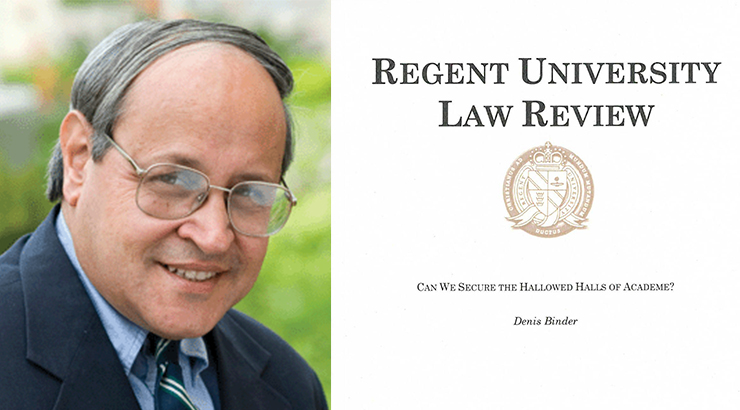
Fowler Law Professor Denis Binder Publishes “Can We Secure the Hallowed Halls of Academe?”
September 12, 2016
Chapman University Dale E. Fowler School of Law Professor Denis Binder’s article “Can We Secure the Hallowed Halls of Academe?” was recently published in Volume 26, Number 2 of the Regent University Law Review.
From the abstract:
Education is a different environ today. As Columbine, Virginia Tech and other tragedies highlight, we have to worry about campus security. Even before Virginia Tech, liability, criminal activity, sexual harassment, and suicides were increasing concerns on campus.
Let us start with a different paradigm today: seemingly random acts of violence, the “going postal” syndrome, can occur anywhere in society, including fast food restaurants, government offices, and even law firms.
Let us also acknowledge that the university community has limited preventative and response options for increasing campus security. Large campuses of 30,000-50,000 students with thousands of doors and windows cannot be run as a high security prison. These campuses cannot be “shut down”, although individual units might be.
The underlying reality is that the normal methods of securing a building are ineffective in academic settings. I submit that it is perhaps even more difficult to secure a college campus against a lone gunman than against a suicide bomber. The gunman can shoot his way through a checkpoint and continue his killing ways, but the bomber, no matter how tragic his act, can only detonate the bomb once.
Securing a campus is different than an enclosed office or factory complex. By their very nature, universities are open centers of learning. The exchange of knowledge is not limited to enrolled students, but offered to the community through guest lectures, visiting scholars, symposia, artistic performances, internet access, sporting events, museums, library services, and graduate and job fairs, often for free.
The normal means of providing a high level of security will usually be ineffective against the mass murderer; badging, armed guards, electronic key locks, emergency call boxes, escorts, lighted parking lots, metal detectors, and video surveillance, may reduce normal criminal activity, but they cannot secure the campus.
A different approach is to learn the lessons from prior campus incidents. For example, the initial phase of an incident will often be obscured by the proverbial fog of war.
One procedure is available to all campuses today: multiple means exist to notify the campus community. I also suggest though that universities reassess their basic approach to emergencies. The nature of any emergency will always be different, but to have in place a well-designed, tested and up-to-date emergency response plan will minimize the threat. This article explores some of these options.
Professor Binder’s career teaching Antitrust, Environmental Law, Torts and Toxic Torts at law schools nationwide spans more than 40 years. He has served as a consultant to a variety of organizations, ranging from the Army Corps of Engineers to Cesar Chavez and the United Farm Workers. In September 1996, Professor Binder received the National Award of Merit from the Association of State Dam Safety Officials for his contributions to promoting dam safety over the preceding two decades. He graduated first in his class at the University of San Francisco School of Law and received his LL.M. and S.J.D. degrees from the University of Michigan Law School. Professor Binder served as the President of the Chapman University Faculty Senate during the 2006-2007 academic year and as chair of the Environmental Law Section of the Association of American Law Schools for 2011-2012 academic year. Other recent articles include “An Outsider’s Perspective on Istanbul’s Emergency Planning,” in the Bahcesehir Law Review in 2014, and “Looking Back to the Future: The Curmudgeon’s Guide to the Future of Environmental Law,” in the Albany Law Review in 2013.

